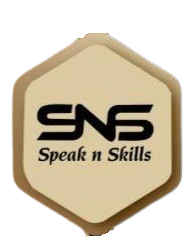Introduction to IELTS exam
Getting a high score in IELTS is all about preparation and practice. The more you study, the better your score will be. Here is how to prepare for an IELTS exam

Start with a plan.
The first step to scoring 7+ in IELTS is planning. Don’t just start studying without a plan. Make sure that you have a clear idea of what you want to achieve and how long it will take for you to achieve that goal. Choosing the right institute is very significant to start your IELTS preparation, Speak N Skills has the best trainers for the same who are qualified and experienced and helped 1000+ students achieve their desired results.
The best way to start planning is by deciding on which materials and resources will be helpful during this process, such as books or online courses offered by various institutions around the world (e-learning). This method also allows students who may not have access either physically or financially when taking part in these programs access them once again through different means such as borrowing books from friends’ houses!
Develop a habit of revision.
The best way to improve your score in the IELTS is by doing a lot of practice. However, it is important that you do not rush through your revision process and instead take your time on each section. You should aim for at least 10 minutes per section at first, but if you have more time then try increasing this number gradually until it reaches 20 minutes per section (or even 30).
It’s also important that all of your revision sessions are done separately from any other activities so as not to get distracted or lose focus when doing so!
Develop a habit of writing to score better in IELTS
To get the most out of your writing, you need to develop a habit of writing. There are plenty of things you can do to help build this habit:
Write as much as possible. This doesn’t mean that you should write for hours every day or even every week. But it does mean making time for regular writing sessions in which you put pen to paper and try to produce something new and get it checked from your mentor to review whether you are on the right track or not.
Write on topics that interest you. If your favorite subject is travel, then spend some time researching travel destinations for future articles or essays; if your other passion is history and politics, then find an interesting historical event that happened recently (like Brexit) and write about it—it’ll be easy enough if there’s no deadline! The point here isn’t just about adding more content into your portfolio but also focusing on topics that will help inform others so they’re better informed too…
The more you read, the better you write.
Reading is one of the most important skills you can develop in your life. Not only does reading give you access to a wide range of information, it also helps develop your vocabulary and critical thinking skills.
Reading newspapers, magazines and books is an excellent way to improve your English language abilities because it gives you practice using new words, listening out for key ideas in sentences and being aware that what is written also has meaning beyond just being written down on paper.
Talk to yourself
You can talk to yourself in English, but you should also speak in your native language if it helps.
You can talk to yourself about the things you are learning and/or anything related to the test.
It is important that you talk about what is being tested and how it relates to other topics on the test.
Speak aloud whenever you get time.
You should speak aloud to yourself and your friends. The more you speak aloud, the better chance you have of recalling what was said. Speak as naturally as possible and do not worry about sounding smart or formal because it will not help with IELTS speaking test.
Don’t just speak- write too!
Writing is a great way to practice your writing skills.
Writing helps you think about what you want to say and how best to say it. It can also help with vocabulary, grammar and spelling.
IELTS preparation is not about hard work only, but it’s about effectively using every minute in preparation for the test
IELTS preparation is not about hard work only, but it’s about effectively using every minute in preparation for the test. If you are going to take an exam, you should get all your resources ready before hand. There are many things that can be done during this period and they will help you in getting a good score on your IELTS exam.
Read books and magazines related to language learning or what kind of content they might have such as articles, news etc., so that you will have an idea where you want your scores out of 100 points from each section(English Grammar/Grammar Practice). The more time spent reading these types of materials can really help with improving overall accuracy when answering questions about grammar rules/usage issues.*
Find out how much time it takes for each task or question type before starting working on them individually (for example: listening comprehension). Once this has been determined then make sure there isn’t too much overlap between different tasks within each section – otherwise spend less time doing one thing instead using up valuable time later on when trying something else.* Ensure everyone gets involved by sharing feedback regularly throughout our sessions – this helps us understand where everyone needs help!
Conclusion
If you have made it to this point and are still reading this article, then I think it’s safe to say that you are interested in taking the IELTS test. https://www.google.com/search?q=SPEAK+N+SKILLS+%28Uttam+Nagar%29+for+IELTS,+PTE,+OET,+Spoken+English,+Personality+Development&source=lmns&authuser=0&bih=657&biw=1366&hl=en&sa=X&ved=2ahUKEwjEqIjRx_P7AhWCjNgFHboEC00Q_AUoAHoECAEQAAIf so, there is no better time than now! You can start preparing for IELTS Contact Speak N Skills @ +917982757636 https://speaknskills.com/exam-preparation/ielts/

